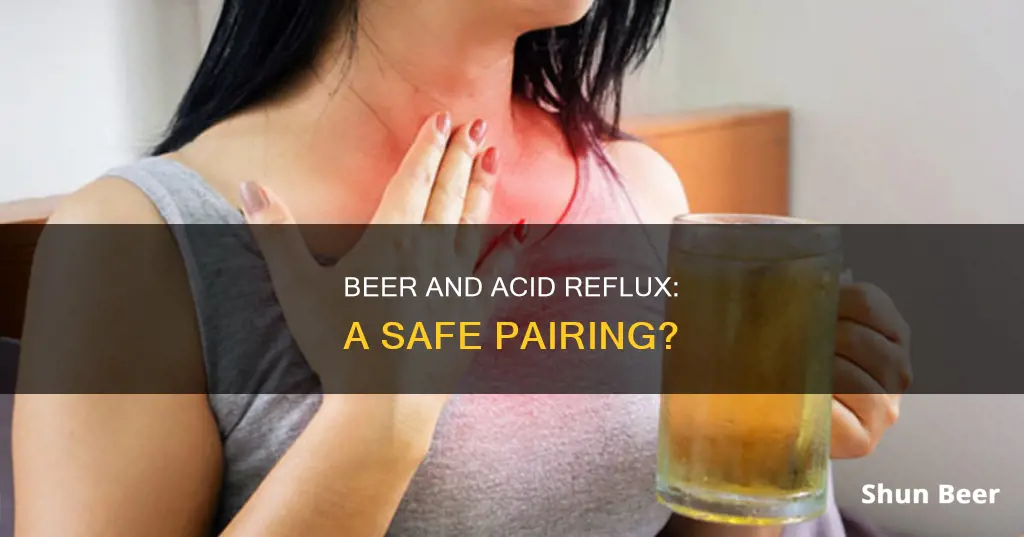
Alcohol is a known trigger for acid reflux and GERD, a more severe form of acid reflux. Acid reflux is when stomach acids flow back up into the oesophagus, causing pain, discomfort, and other symptoms like vomiting, chest pain, and heartburn. While some people with GERD choose to avoid alcohol completely, others want to know if they can still enjoy a drink with friends. So, can you drink beer if you have acid reflux?
What You'll Learn

Alcohol is a known trigger for acid reflux and GERD
According to a 2019 review, drinking alcohol can increase the risk of developing GERD. Researchers found that higher intake and frequency were more strongly linked with GERD. A 2018 review also found an association between the frequency and increase in alcohol consumption and GERD. Alcohol damages the mucus in the lining of the gastric system and impairs oesophagus contractions, increasing the risk of acid reflux.
Alcohol can trigger acid reflux in two ways. First, alcohol is a known trigger of GERD. Second, alcohol is a diuretic, which means it causes you to urinate more often, leading to dehydration, which makes acid reflux symptoms worse. In addition, alcohol can also cause the lower oesophageal sphincter (LES) to malfunction, which leads to increased symptoms of acid reflux.
If you suffer from acid reflux, it is best to avoid drinking alcohol altogether. However, if you do choose to drink, there are a few things you can do to minimize the risk of worsening your symptoms. First, try to drink in moderation, as heavy drinking can increase the risk of acid reflux flare-ups. Second, make sure you stay hydrated, as dehydration can make acid reflux symptoms worse. Third, avoid drinking acidic or carbonated drinks, as these can irritate the stomach and increase symptoms of acid reflux. Finally, eat small meals and avoid eating late at night, as large meals can increase the risk of acid reflux, and eating late can aggravate symptoms.
Wet Paper Towel on Beer: Does This Method Work?
You may want to see also

Beer and wine can trigger acid reflux
Acid reflux is a condition where stomach acid flows up to the oesophagus, causing symptoms such as heartburn, regurgitation, burping, and a sore throat. It is usually associated with spicy food, dairy, and alcohol. Gastroesophageal reflux disease (GERD) is a more severe and chronic form of acid reflux.
Alcohol is a known trigger for acid reflux and GERD. It can trigger acid reflux in two ways: by causing GERD and by being a diuretic, which leads to dehydration, thereby worsening acid reflux symptoms. Alcohol can also cause the lower oesophageal sphincter (LES) to malfunction, which leads to increased acid reflux symptoms. The LES is responsible for keeping stomach acids from flowing back up into the oesophagus.
Beer and wine have been found to trigger acid reflux in both men and women compared to drinking water. However, red wine has been shown to increase resistance to acidity in the oesophageal lining. Additionally, a 2008 study found that drinking wine could reduce the risk of reflux oesophagitis or irritation of the oesophageal lining.
The varying levels of alcohol in each drink also play a role in acid reflux. For example, light beers and wines with a lower alcohol content may help curb acid reflux due to being light-bodied beverages. On the other hand, stronger drinks like whiskey and Scotch could make your symptoms worse.
If you suffer from acid reflux, it is recommended to avoid drinking alcohol altogether. However, if you choose to drink, there are a few things you can do to minimize the risk of worsening your symptoms:
- Drink in moderation. Heavy drinking can increase the risk of acid reflux flare-ups.
- Stay hydrated. Dehydration can make acid reflux symptoms worse.
- Avoid drinking acidic or carbonated drinks, as they can irritate the stomach and increase symptoms of acid reflux.
- Avoid drinking 2-3 hours before bed. Lying flat immediately after drinking can increase the risk of acid reflux at night as alcohol relaxes the lower part of the oesophagus, making it easier for stomach acid to back up.
- Eat small meals and avoid eating late at night. Large meals can increase the risk of acid reflux, and eating late can aggravate symptoms.
The Magic of Beer Guns: Filling and Foaming Perfection
You may want to see also

Spirits with a high ethanol content may be better for acid reflux
Alcohol is a known trigger for acid reflux and its more severe form, gastroesophageal reflux disease (GERD). When you drink alcohol, it can trigger acid reflux in two ways: firstly, alcohol is a known trigger of GERD, and secondly, alcohol is a diuretic, which causes increased urination and can lead to dehydration, making acid reflux symptoms worse. Additionally, alcohol can cause the lower oesophageal sphincter (LES) to malfunction, leading to increased acid reflux symptoms.
If you suffer from acid reflux, it is best to avoid drinking alcohol altogether. However, if you choose to drink, there are some types of alcoholic beverages that are less likely to cause problems with acid reflux. The type of alcohol you consume matters, as certain varieties can worsen acid reflux symptoms.
Spirits with a high ethanol content, such as vodka and whiskey, are better choices for those with acid reflux. These distilled spirits are low in calories and carbs and do not contain any sugar. They also have a higher alcohol content, which means you can consume less liquid, reducing the risk of overconsumption and its negative effects on acid reflux.
Neutral spirits, also known as rectified spirits, are highly concentrated ethanol that has been purified through repeated distillation. They are typically distilled at 96-96.5% ABV and diluted as needed. Neutral spirits are used in the production of several spirit drinks, such as blended whisky, cut brandy, gin, some liqueurs, and bitters. As a consumer product, they are often mixed with other beverages or added to cocktails.
While distilled spirits with high ethanol content may be a better option for those with acid reflux, it is important to remember that overconsumption of any type of alcohol can negatively affect acid reflux and other health-related symptoms. Enjoy alcoholic beverages in moderation and stay hydrated to minimise the risk of worsening acid reflux symptoms.
Drinking Beer at the Park: Is It Legal?
You may want to see also

Drinking 2-3 hours before bed increases the risk of acid reflux
Drinking alcohol is a known trigger for acid reflux, a condition where stomach acid flows up to the oesophagus, causing symptoms such as heartburn, regurgitation, burping, and sore throat. Beer enthusiasts with acid reflux may be wondering if they can still enjoy their favourite drink without aggravating their condition.
The answer is yes, but with some precautions. Firstly, it is important to understand that not all alcoholic drinks are equal when it comes to acid reflux. The alcohol by volume (ABV) plays a significant role, with stronger spirits like whisky and Scotch being more likely to trigger symptoms compared to light beers and wines with an ABV of around 5%. So, when making a choice, it is best to opt for lower ABV options.
Secondly, drinking 2-3 hours before bed increases the risk of acid reflux. This is because it takes approximately 3-4 hours for the stomach to empty and reduce the volume of fluid that can reflux past the lower oesophageal sphincter (LES). The LES is responsible for keeping stomach acids from flowing back up into the oesophagus. When we lie down, the effects of gravity can cause the stomach contents to press against the LES, increasing the likelihood of acid reflux. Therefore, it is advisable to avoid drinking within 2-3 hours of bedtime to reduce the risk of acid reflux symptoms while sleeping.
Additionally, drinking in moderation is crucial. Heavy drinking can increase the risk of acid reflux flare-ups. Staying hydrated is also essential, as dehydration can worsen acid reflux symptoms. Avoiding acidic or carbonated drinks is recommended, as they can irritate the stomach and increase acid reflux symptoms. Lastly, eating small meals and avoiding late-night snacks is important, as large meals can increase the risk of acid reflux, and eating close to bedtime can aggravate symptoms.
In conclusion, while it is best to avoid alcohol altogether if you suffer from acid reflux, you can minimise the risk of worsening your symptoms by following the above guidelines. However, if you experience any acid reflux symptoms, it is advisable to consult your doctor for diagnosis and treatment.
The Science Behind Beer Koozies: Do They Really Work?
You may want to see also

Alcohol can be enjoyed in moderation to avoid acid reflux
Alcohol is a known trigger for acid reflux and GERD, a more severe form of acid reflux. However, this does not mean that you have to give up alcohol entirely if you suffer from acid reflux. The key is to enjoy alcohol in moderation to avoid triggering acid reflux symptoms. Here are some tips to help you enjoy alcohol without worsening your acid reflux:
Limit Your Intake: Heavy drinking can increase the risk of acid reflux flare-ups. Stick to one drink per night and avoid binge drinking. According to a 2022 review, drinking three or fewer alcoholic beverages a week may be associated with a lower risk of GERD.
Choose Your Drinks Wisely: Opt for drinks that are less likely to trigger acid reflux. Light beers, wines with low ABV (around 5%), and distilled spirits like vodka, whiskey, gin, and tequila are better choices. These drinks have lower calories, carbs, and sugar content, which can help minimize acid reflux symptoms.
Avoid Acidic and Carbonated Drinks: Beverages with high acidity, such as citrus juices, margaritas, and daiquiris, can irritate the stomach and trigger acid reflux. Carbonated drinks, including some beers, can also worsen symptoms.
Stay Hydrated: Alcohol is a diuretic, which means it can dehydrate you and make acid reflux symptoms worse. Make sure to drink plenty of water along with your alcoholic beverage to stay hydrated and dilute stomach acids.
Avoid Late-Night Drinking: Drinking alcohol close to bedtime can lead to a night of heartburn and regurgitation. Avoid drinking within 2-3 hours of going to bed to give your stomach enough time to empty its contents.
Eat Small Meals: Large meals can increase the risk of acid reflux. If you're planning to drink alcohol, opt for smaller meals and avoid eating late at night.
While following these tips can help reduce the risk of acid reflux flare-ups, it's important to remember that everyone's triggers may vary. Listen to your body and consult your doctor or a healthcare professional for personalized advice and treatment options.
Gun Owners and Alcohol: Drinking and Carrying a Firearm
You may want to see also
Frequently asked questions
It is not recommended to drink beer if you have acid reflux as it is a known trigger. Beer and wine have been found to trigger reflux in both men and women.
Common symptoms of acid reflux include heartburn, regurgitation, burping, a sore throat, vomiting, and chest pain.
Recommended drinks for people with acid reflux include water, low-fat milk, and herbal teas.
Spirits with a high ethanol content, such as gin, whiskey, and cognac, are least likely to trigger acid reflux.
Alcohol can trigger acid reflux by increasing acidity in the stomach and causing the lower esophageal sphincter to malfunction, allowing stomach acid to flow back up into the esophagus.







